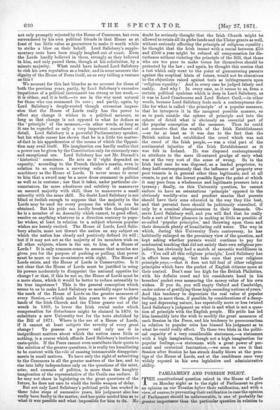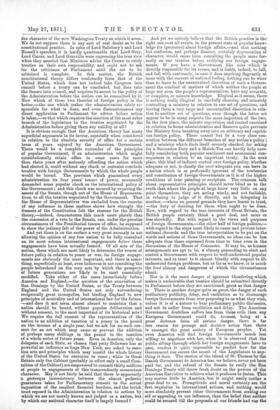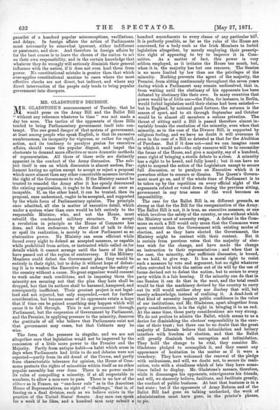PARLIAMENT AND FOREIGN POLICY.
THE constitutional question raised in the House of Lords on Monday night as to the right of Parliament to give an opinion on our Treaties before their ratification, and with a view, of course,to preventing their ratification in case the opinion of Parliament should be unfavourable, is one of probably far greater importance than the particular question in relation to the character of the new Washington Treaty on which it arose. We do not suppose there is any sort of real doubt as to the constitutional practice. In spite of Lord Salisbury's and Lord Russell's speeches, it is hardly questionable that Lord Grey, Lord Cairns, and Lord Granville were expressing the true view when they asserted that Ministers advise the Crown to ratify treaties on their own responsibility, and ought not to ask for the criticisms of Parliament until the act to be criticized is complete. In this matter, the British constitutional theory differs confessedly from that of the United States, which does not indeed take Congress into council before a treaty can be concluded, but does take the Senate into council, and requires its assent to the policy of the Administration before the nation can be committed by it. Now which of these two theories of foreign policy is the better,—the one which makes the administration solely re- sponsible for what is done, and even discountenances any direct application to Parliament for advice before action is taken,—or that which requires the sanction of the most sober branch of the legislature to the treaties negotiated by the Administration before giving them any validity at all?
It is obvious enough that the American theory has many superficial arguments in its favour, especially when considered in relation to the absolute security of office for a certain term of years enjoyed by the American Government. There would be a complete surrender of the principles of popular Government, if an administration which might constitutionally retain office in some eases for more than three years after seriously offending the nation which had elected it, could without any check or restraint conclude treaties with foreign Governments by which the whole people would be bound. The provision which guaranteed every administration its four years' tenure of power, necessarily demanded some popular check on the international policy of the Government ; and this check was secured by requiring the assent of the Senate, though not of the House of Representa- tives, to all the treaties negociated by the Government. That the House of Representatives was excluded from the exercise of any influence in these matters shows how strongly the framers of the Constitution felt the reasons for the British theory,—indeed, demonstrates this much more plainly than the concession of a veto to the Senate, can, under the peculiar circumstances of the Presidential tenure of office, be supposed to show the jealousy felt of the power of the Administration.
And yet there is on the surface a very great anomaly in not allowing the opinion of any free nation to be fully consulted on its most solemn international engagements before those engagements have been actually formed. Of all acts of the nation, those which are most likely to determine the course of future policy in relation to peace or war, its foreign engage- ments are obviously the most important, and there is some- thing, superficially at least, even ludicrous in not consulting the people beforehand on the very acts by which the prospects of future generations are likely to be most essentially modified. Take either of the eases immediately before America and England,—the question of the annexation of San Domingo by the United States, or the Treaty between England and the United States not only surrendering reciprocally great monopolies, but binding England to new principles of neutrality and of international law for the future, —and does it not seem almost absurd to maintain that a nation should be bound, without popular deliberation and without consent, to the most important of its historical acts ? We require the full consent of the representatives of the nation to an addition of taxation of a penny in the pound on the income of a single year, but we ask for no such con- sent for an act which may cause or prevent the addition of perhaps many shillings in the pound to the taxation of a whole series of future years. Even in America, only the delegates of each State, so chosen that petty Delaware has as powerful an influence as huge New York, are asked to sanc- tion acts and principles which may mould the whole history of the United States for centuries to come ; while in Great Britain only the Cabinet (probably in effect only a small Com- mittee of the Cabinet) are empowered to commit thirty millions of people to engagements of this transcendently momentous character. May it not fairly be said that there is apparently a grotesque inconsistency between the almost pedantic guarantees taken for Parliamentary consent to the actual imposition of the smallest financial burdens, 'and the lavish trust reposed in the Administration in relation to actions by which we are not merely known and judged as a nation, but by which our national character itself is largely formed? And yet we entirely believe that the British practice is the right one,—at all events, in the present state of popular know- ledge (or ignorance) about foreign affairs,—and that nothing but confusion, and perhaps disaster, certainly degeneration of character, would ensue from consulting the people more for- mally on our treaties before ratifying our foreign engage- ments. If you have a Government like ours which is directly responsible for its errors, and is liable, indeed, to fall, and fall with contumely, in case it does anything flagrantly at issue with the current of national feeling, nothing can be wiser than to leave to the unrestrained discretion of such a Govern- ment the conduct of matters of which neither the people at large nor even the people's representatives, have any accurate, or complete, or minute knowledge. Illogical as it seems, there is nothing really illogical in carefully choosing and minutely controlling a ministry in relation to one set of questions, and leaving them a very large and uncontrolled discretion in rela- tion to another set of questions, even though the latter set appear to be in many respects the more important of the two. In the first place, the minute supervision and control exercised in relation to home administration and finances quite prevents the Ministry from breaking away into an arbitrary and caprici- ous foreign policy. There cannot but be a very close con- nection between the different branches of any nation's policy ; and a ministry which finds itself severely checked for asking for a Succession Duty and a Match-Tax can hardly help care- fully considering both popular sentiment and economical con- sequences in relation to an important treaty. In the next place, this kind of indirect control over foreign policy, whether adequate or not, is clearly the most adequate you can have in a nation which is as profoundly ignorant of the tendencies and constitution of foreign Governments as it is of the higher conditions of true painting or sculpture. The common talk about representative principles should never blind us to the truth that where the people at large know very little on any point themselves, they are acting wisely, and not foolishly, in refusing to judge of it directly, and in delegating to another,—whom on general grounds they have learnt to trust, —the duty of deciding for them what ought to be done. Now, with regard to the true interests of Great Britain, the British people certainly think a good deal, and more or less shrewdly. But with regard to the views and purposes of foreign Governments,—the other half of foreign politics,— with regard to the steps most likely to cause and prevent inter- national discords, and the true interpretation to be put on the words and actions of those Governments, no ideas can be less adequate than those expressed from time to time even in the discussions of the House of Commons. It may be, as human arrangements are apt to be, a. clumsy proceeding to elect and control a Government with respect to well-understood popular interests, and to trust to it almost blindly with respect to ill. understood foreign problems, but as far as we know, it is much the least clumsy and dangerous of which the circumstancea admit.
Nor is it the mere danger of ignorant blundering which makes it undesirable that treaties should be submitted directly to Parliament before they are sanctioned, great as that danger is. There is another danger quite as great, the danger of such preliminary publicity, delay, and vacillation as to discourage foreign Governments from ever proposing to us what they wish, unless it is of a nature to bear preliminary public discussion, and not to suffer from vacillation and delay. The American Government doubtless suffers less from these evils than any European Government could do, because, being at a great distance from all serious danger, there is far less reason for prompt and decisive action than there is amongst the great society of European peoples. Yet even America will find foreign Governments much less willing to negotiate with her, when it is observed that the public sifting through which her foreign engagements have to pass, renders it quite impossible to predict how far the Government can secure the assent of the Legislature to any- thing it does. The cession of the island of St. Thomas by the. Danish Government to America has, we believe, never yet been paid for, and the refusal of the Senate to ratify the San Domingo Treaty will throw fresh doubt on the powers of the American Executive to achieve what it professes to desire. This may matter little to America, but it might easily mattor a great deal to us. Promptitude and moral certainty are. the first requisites in international actions, and nothing would more absolutely prevent other Governments from seeking our aid or appealing to our influence, than the belief that neither could be secured till the proposals of our friends had ran the gauntlet of a hundred popular misconceptions, vacillations, and delays. In foreign affairs the action of Parliaments must necessarily be somewhat ignorant, either indifferent or passionate, and slow. And therefore in foreign affairs by far the best course is to leave the chosen of the nation to act on their own responsibility, and in the certain knowledge that whatever they do wrongly will seriously diminish their general influence with the nation, if it does not even hurl them from power. No constitutional mistake is greater than that which over-applies constitutional maxims to cases where the most effective checks are not direct, but indirect, and where any direct intervention of the people only tends to bring popular government into disrepute.




































 Previous page
Previous page